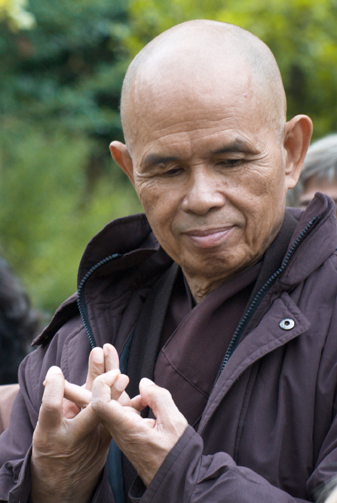magazine, which also extolls the benefits of a $250 french fry maker and $300 Ugg boots. I was disconcerted. This was several years ago, and I was fairly new to Buddhist study and protective of the teachings, which didn't seem to belong in a bible of conspicuous consumption and body image. It seemed to be a misappropriation of the teachings.
But Oprah's helped popularize teachers like Pema Chodron and Sharon Salzberg, and I've come to believe that mindfulness is a good thing, no matter how it comes about. That's beneficial since mindfulness has only become more ubiquitous.
Mindfulness, it seems, has become a thing unto itself. The New York Times reports that everyone from techies to celebrities to CEOs to the Marines are practicing mindfulness, which it calls "a loose term that covers an array of attention-training practices. It may mean spending 10 minutes with eyes closed on a gold-threaded pillow every morning or truly listening to your mother-in-law for once."
The Times credits Thich Nhat Hanh, as "the Vietnamese Buddhist leader who introduced mindfulness to westerners (Google got first dibs on him as a guest speaker)" but focuses on how technology companies are using mindfulness.
Walter Roth, 30, chief executive of a tech start-up called Inward Inc. ... (said) mindfulness has made him more competitive. “Not only do I put fewer things on my to-do list but I actually get them done and done well. It’s like I’ve learned that to be more successful and accomplish more, I must first slow down.”In response, the Buddhist Peace Fellowship points out that the Buddha didn't intend mindfulness to be divorced from ethics and wisdom. It also quotes Thich Nhat Hanh, noting that he called for people
to use mindfulness as a basis for engaging in the world. "When bombs begin to fall on people, you cannot stay in the meditation hall all of the time… You have to learn how to help a wounded child while still practicing mindful breathing," he is quoted as saying.
(What that seems to prove is the emptiness of Thich Nhat Hanh -- there is no single, unchanging TNH.)
What is the right view of mindfulness?
Is there one?
David McMahan, a professor of religion at Franklin and Marshall College, says mindfulness may be becoming "a folk religion of the secular elite in Western culture." McMahan, who studies the role of social and cultural context in meditation, tells Tricycle magazine:
Right now, for the first time ever, we have contemplative practices derived from the Buddhist tradition that are being practiced completely independently of any Buddhist context. Secularization has filtered out what we would call “religious elements.” It is those religious elements, those ethical elements, and those intentions that have always formed the context of meditation and that have made meditation make sense. Otherwise, what sense does it make to sit down for half an hour and watch your breath? Somebody has to explain to you why that matters, why it is a good idea, and what it is actually doing in the larger scheme of things.
When meditation comes to the West completely independently of that, it is like a dry sponge; it just soaks up the cultural values that are immediately available. So it becomes about self-esteem. Or it might be about body acceptance or lowering your stress. It might be about performing lots of different tasks efficiently at work. It might be about developing compassion for your family. A whole variety of new elements now are beginning to form a novel context for this practice, which has not only jumped the monastery walls but has broken free from Buddhism altogether.Whether this is good or bad remains to be seen, he says.
That's true with everything. We can't ever know with certainty what will happen. We may be able to predict the result of a particular action, but interdependence means that ripples out and has consequences that may be far beyond what we expect. Which is why, as a Buddhist, I try to live with the intention of non-harming. Intention is paramount because it sets the direction for actions.
One practice is to start the day by setting an intention: to be patient, to be kind, to be generous -- and to focus on that area. That makes it more likely that actions will incline in that direction by at least making us aware. And that's where mindfulness comes in. Having set an intention, we become more mindful about how we bring that into a situation.
For me, mindfulness practice inevitably leads to ethics and compassion. If you pay attention to what
you're doing, you must see how that affects others. And if you see how it affects others, your heart opens to them.
The vast intention, in Buddhism, is to be of benefit to all beings. That sounds overwhelming at first, but when you practice the intention becomes natural. Does that mean it's easy to make every action support that? No, but it's more likely than if you don't try.
Some of the secular mindfulness training seems to be aimed at benefiting individuals or corporations. Will that inevitably lead to ethics and compassion?



No comments:
Post a Comment